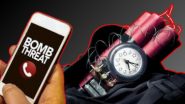At least 137 people have been killed in the attack on the "Crocus City Hall" in Moscow. The Russian rock band, Picnic, was due to perform on stage on Friday. What does their performance have to do with the attack?On the evening of Friday March 22, at around 8 p.m. local time, the Moscow concert venue, Crocus City Hall, became the scene of a bloody attack — the exact background of which is still the subject of speculation. At least 137 were killed in the massacre, while many others are in critical condition. They were all awaiting a concert by the Russian rock band Picnic, which was due to start at 9 p.m.
'Wash yourself with your own blood'
Also Read | India News | SDF Announces Candidate List, Chamling to Contest from Poklok-Kamrang Assembly Seat.
Russia has been in a state of shock ever since. While the whole world is expressing its sympathy, rumors and false information are doing the rounds. Four suspects have been brought before a court in the Russian capital. The four Tajiks were formally accused of involvement in a terrorist attack by the Basmanny district court on Sunday evening. They face possible life imprisonment. At the same time, people are wondering why the terrorists chose this particular event. Was the attack also aimed at the band Picnic?
"Fear nothing, fear nothing — no fire, no ringing shadow. You are no longer a rosy child. Wash yourself with your own blood in the morning. And shake the blossoming day." These are some of the lyrics of Picnic's new song, which was released on March 7 on the band's YouTube channel.
Those lines sound almost prophetic, especially now in Russia. A message posted on the band's website reads, "We express our deepest sympathy to the families and friends of the victims. We pray for the speedy recovery of the injured. We are deeply shocked by this terrible tragedy and mourn with you." The band's musicians were unharmed because they were able to hide in the dressing room.
Picnic is one of the veterans of the Russian music scene, with origins in progressive rock. Founded in 1978 in St. Petersburg, which was still called Leningrad then, the band initially called itself Orion before changing its name to Picnic in 1981. Both monikers go back to the typical Soviet rock scene trick of choosing names that sound Western but cannot be banned.
In the 1980s, however, Picnic ended up on the list of bands that were denied major public appearances. The musicians and their audience therefore lived out their love for role models such as Led Zeppelin and the Rolling Stones in rock clubs, sometimes underground. Singer and songwriter Edmund Shklyarsky has been the band leader since 1982. The son of a renowned scientist and a concert pianist, Shklyarsky attaches great importance to his Polish roots and his Catholic faith. From an early age, his sources of inspiration were not only the Rolling Stones and The Animals, but also Russian avant-garde poetry.
Picnic members are considered war supporters
In May 2023, Russian writer and nationalist activist Zakhar Prilepin praised the band's leader. According to Prilepin, Shklyarsky actively supported the "special operation" in Ukraine, among others through monetary donations. Prelepin further presumed that this was the "normal position of a Russian man and a Russian musician" — a statement that has neither been denied nor confirmed by the members of Picnic.
Their being booked to perform in venue as renowned as the Crocus City Hall in Moscow can be seen as proof of the band's loyalty to the Russian state — which had demanded a clear commitment from the country's rock and pop scene, especially when the war against Ukraine began. Musicians and bands who positioned themselves against the war — including Russian stars such as Boris Grebenshchikov (Aquarium), Yuri Shevchuk (DDT) and Zemfira — had to leave the country and suffered career setbacks. Russian pop diva Alla Pugacheva has also sharply criticized the Putin regime from abroad.
On the other hand, stars loyal to the regime are rewarded with lucrative performances and awards. The approximately 6,200 tickets for the Picnic concert on March 22 were almost sold out, as was the planned second gig on Saturday. Ticket prices ranged from €100 to €300 and the band was to be accompanied by a symphony orchestra and a "spectacular stage and light show," at least according to advertising.
Even before Russia's invasion of Ukraine, Picnic was added to the list of artists unwelcome in Ukraine. The reason for this was the band's repeated performances on the occupied Crimean peninsula, including in Sevastopol.
The day after the tragedy, numerous interview requests, including from DW, were met with nothing but expressions of grief and shock. On Sunday, March 24, Edmund Shklyarsky released a video message. "I would like to express my condolences to all the victims and relatives of this terrible and senseless tragedy," he said, adding that no words have yet been invented that could resurrect people and comfort their fellow human beings.
Whether there's any special significance in the terrorists' choice to attack a concert by this particular band remains a matter of speculation — as does the question of whether Crocus City Hall plays any special role as the target of the carnage.
A concert venue of superlatives
Crocus City Hall is a state-of-the-art concert hall on the grounds of an exhibition complex and is probably the most prestigious stage in Moscow among musicians. With an audience capacity of 5,000 to 10,000 people, it is much larger than a traditional concert hall and only slightly smaller than a soccer stadium. In short, a superlative venue in Moscow with no competitors.
Completed in 2009, Crocus, as it is known for short, quickly became one of Russia's most important concert halls. Located some 20 kilometers from the Kremlin, the venue can be reached within 30 minutes from the city center, depending on Moscow's notorious traffic congestions. It's faster for residents of the affluent suburbs in the west of the city, who prefer to attend the concerts there.
The excellent public transport links could have been an argument for the terrorists to choose Crocus City Hall for their attack. In addition, security precautions on the outskirts of the city are not as strict as in the center of Moscow.
Cultural events canceled in Russia
The concert hall belongs to the group of companies owned by the Azerbaijani-Russian construction tycoon and oligarch Aras Agalarov and his son Emin, a businessman and singer. There were rumors when the Crocus opened that Aras Agalarov had built his son a stage.
In recent years, however, Emin Agalarov has put his pop career on hold and concentrated primarily on the development and marketing of Crocus City Hall. Over the years, internationally renowned bands have performed here: Scorpions, Smokie, Pet Shop Boys, Nazareth and A-ha, as well as Sting, Elton John, Thomas Anders, Vanessa May and many others. In 2013, Donald Trump even strayed onto the stage, as a special guest at the final of the Miss Universe competition. But those days of cosmopolitanism are long gone.
A look at the program at Crocus City Hall gives a good insight into the sensitivities of Russian society, which oscillates between denial of reality and resignation: Concerts by regime-compliant musicians alternate with entertainment blockbusters such as Japanese drum shows or women's stand-up comedy. Now all major events have been canceled, not only in the damaged Crocus City Hall, but throughout Russia. Theaters, cinemas and museums will remain closed for the time being.
This article was originally written in German.
(The above story first appeared on LatestLY on Mar 25, 2024 08:00 PM IST. For more news and updates on politics, world, sports, entertainment and lifestyle, log on to our website latestly.com).













 Quickly
Quickly




















